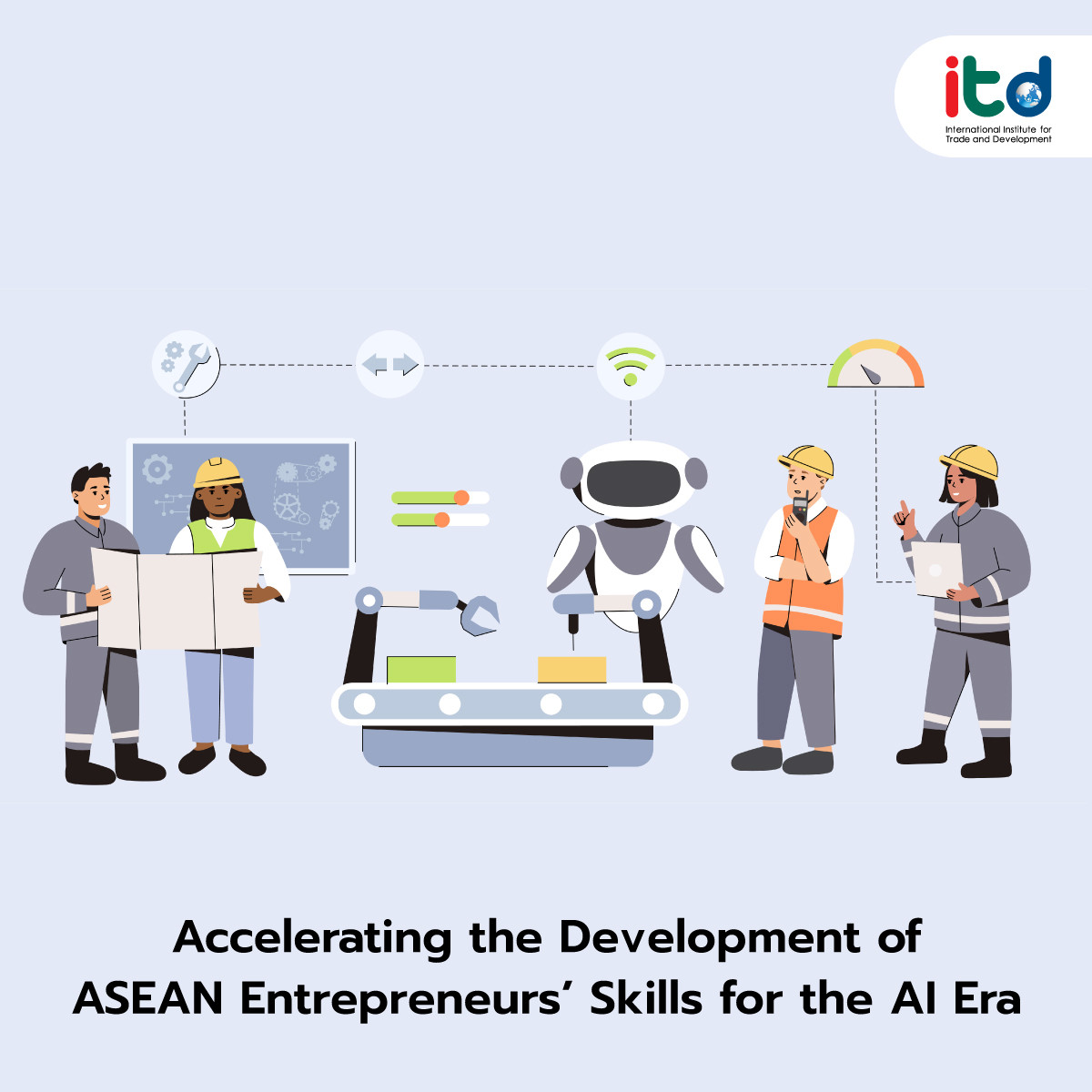About Documents
The 2025 Annual Meeting of the World Economic Forum (WEF) in Davos, Switzerland, underscored the significance of entrepreneurial skill development in the ASEAN region to prepare for the rapidly evolving economic and technological landscape.
The advancement of entrepreneurial skills must align with future labor market trends. The contemporary world is increasingly driven by Artificial Intelligence (AI), Big Data, automation, and the digital economy. These transformations have profound implications for the global economy and labor markets.
The Future of Jobs Report 2025 analyzed labor market trends for the period 2025-2030, based on a global employer survey. The report revealed a significant increase in the demand for professionals with expertise in AI and Big Data, with a 96% growth in demand for these skills in 2023. Additionally, 86% of global companies anticipate that AI and Big Data will fundamentally transform business operations by 2030.
The report further projects that by 2030, over 170 million new job positions will be created, while approximately 92 million jobs will be displaced. The fastest-growing professions include Big Data specialists, AI experts, cybersecurity analysts, fintech professionals, and digital marketing specialists. Conversely, roles in administration, accounting, and other fields susceptible to automation are expected to decline significantly. Entrepreneurs must understand these trends to design effective business strategies and develop essential skills accordingly.
ASEAN is emerging as a key hub for the digital economy, with projections indicating that its digital economy will expand from $300 billion in 2025 to $1 trillion by 2030. Consequently, investment in digital skill development and educational reform is crucial for ensuring labor market readiness in the AI era and enhancing the competitiveness of entrepreneurs.
According to the report, 86% of ASEAN companies prioritize hiring employees with newly developed skills, compared to the global average of 70%. The ASEAN countries making the most substantial investments in entrepreneurial skill development include Singapore, Malaysia, and Vietnam, all of which have implemented national programs focusing on reskilling and upskilling.
ASEAN recognizes the importance of entrepreneurial skill development and has implemented policies to support the growth of businesses in the region. Key initiatives include the ASEAN Digital Economy Framework Agreement (DEFA), which fosters collaboration among member states in digital skill development and innovation. Furthermore, ASEAN promotes education and training programs designed to prepare the workforce for future employment opportunities. Notable projects include:
ASEAN Digital Skills Vision 2025 – aimed at equipping ASEAN workers with digital and AI skills to adapt to technological advancements.
ASEAN SME Academy – an online training platform designed to help small and medium-sized enterprises (SMEs) develop managerial and technological skills.
Several ASEAN countries have also launched national initiatives to enhance entrepreneurial competencies:
Singapore: The SkillsFuture Singapore (SFS) program provides financial support for lifelong learning and specialized skills training for entrepreneurs and employees.
Vietnam: The Build for the AI Future initiative focuses on AI infrastructure investment, policy development, and workforce training to prepare for future labor market demands.
Malaysia: The establishment of the Malaysian National AI Office (NAIO) in 2024 plays a crucial role in AI policy development, innovation promotion, and ethical AI governance. The NAIO also assesses AI’s impact on public sector operations.
To effectively transition into the AI era, entrepreneurs must prioritize investment in digital skills development, including AI utilization, data analytics, and online marketing, to enhance business efficiency. Additionally, fostering collaborative networks with domestic and international entrepreneurs can facilitate access to resources, knowledge, and new market opportunities.
Entrepreneurs must also maintain adaptability and resilience in response to technological advancements, evolving consumer behaviors, and economic trends. Promoting lifelong learning and continuous skill development will enable entrepreneurs to sustain competitive advantage and navigate emerging challenges.
Furthermore, entrepreneurs should leverage ASEAN’s policy frameworks and support programs, such as DEFA, to expand business opportunities and ensure long-term success in the digital economy.
Author:
Ms. Namphueng Tassanaipitukkul
Senior Researcher
International Institute for Trade and Development (Public Organization)
www.itd.or.th
Publication: Bangkok BIZ Newspaper
Section: First Section/World Beat
Volume: 38 Issue: 12831
Date: Wednesday, Feb. 05, 2025
Page: 8 (left)
Column: “Asean Insight”






